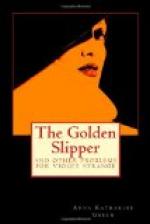“I shot Mr. Hasbrouck,” was his steady affirmation, given without any show of frenzy or desperation. “If you ask me why I did it, I cannot answer; if you ask me how, I am ready to state all that I know concerning the matter.”
“But, Dr. Zabriskie,” interposed one of the inspectors, “the why is the most important thing for us to consider just now. If you really desire to convince us that you committed this dreadful crime of killing a totally inoffensive man, you should give us some reason for an act so opposed to all your instincts and general conduct.”
But the doctor continued unmoved:
“I had no reason for murdering Mr. Hasbrouck. A hundred questions can elicit no other reply; you had better keep to the how.”
A deep-drawn breath from the wife answered the looks of the three gentlemen to whom this suggestion was offered. “You see,” that breath seemed to protest, “that he is not in his right mind.”
I began to waver in my own opinion, and yet the intuition which has served me in cases seemingly as impenetrable as this bade me beware of following the general judgment.
“Ask him to inform you how he got into the house,” I whispered to Inspector D—, who sat nearest me.
Immediately the inspector put the question which I had suggested:
“By what means did you enter Mr. Hasbrouck’s house at so late an hour as this murder occurred?”
The blind doctor’s head fell forward on his breast, and he hesitated for the first and only time.
“You will not believe me,” said he; “but the door was ajar when I came to it. Such things make crime easy; it is the only excuse I have to offer for this dreadful deed.”
The front door of a respectable citizen’s house ajar at half-past eleven at night! It was a statement that fixed in all minds the conviction of the speaker’s irresponsibility. Mrs. Zabriskie’s brow cleared, and her beauty became for a moment dazzling as she held out her hands in irrepressible relief towards those who were interrogating her husband. I alone kept my impassibility. A possible explanation of this crime had flashed like lightning across my mind; an explanation from which I inwardly recoiled, even while I felt forced to consider it.
“Dr. Zabriskie,” remarked the inspector formerly mentioned as friendly to him, “such old servants as those kept by Mr. Hasbrouck do not leave the front door ajar at twelve o’clock at night.”
“Yet ajar it was,” repeated the blind doctor, with quiet emphasis; “and finding it so, I went in. When I came out again, I closed it. Do you wish me to swear to what I say? If so, I am ready.”
What reply could they give? To see this splendid-looking man, hallowed by an affliction so great that in itself it called forth the compassion of the most indifferent, accusing himself of a cold-blooded crime, in tones which sounded dispassionate because of the will forcing their utterance, was too painful in itself for any one to indulge in unnecessary words. Compassion took the place of curiosity, and each and all of us turned involuntary looks of pity upon the young wife pressing so eagerly to his side.




